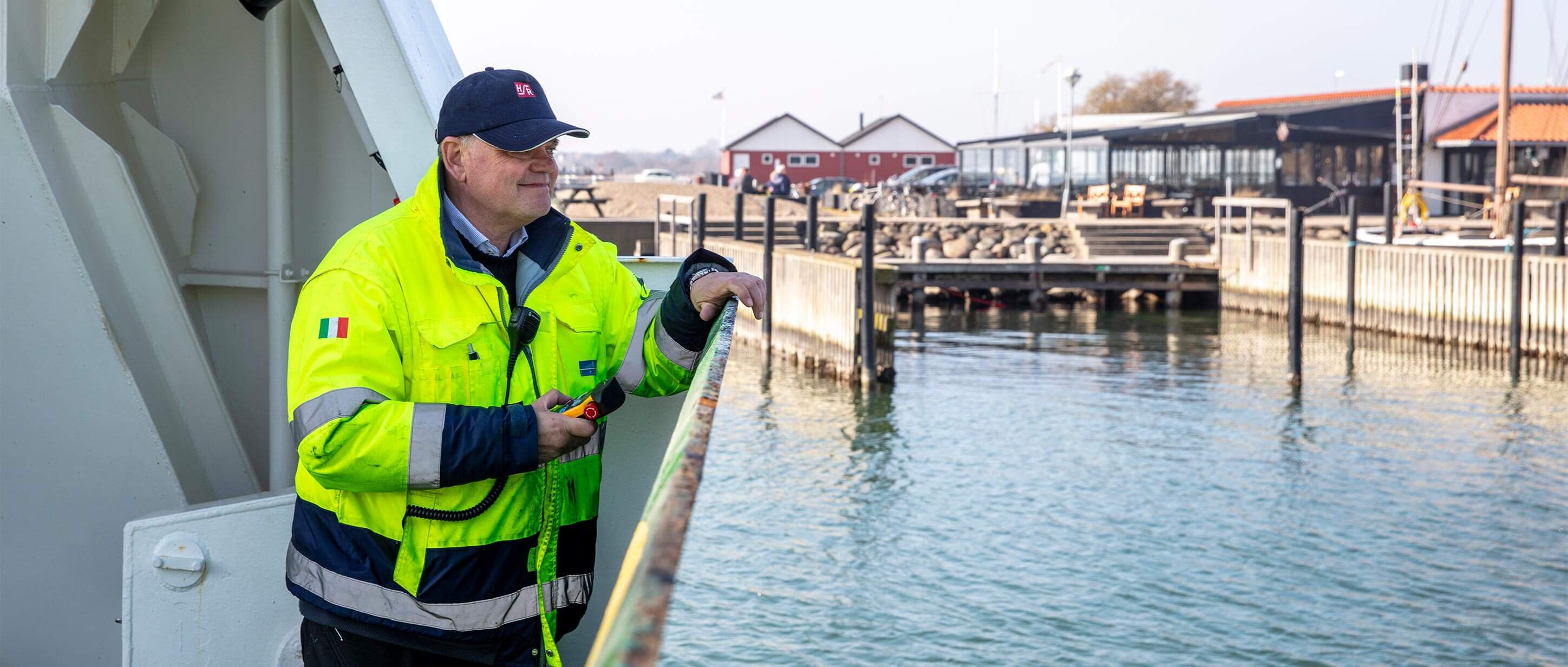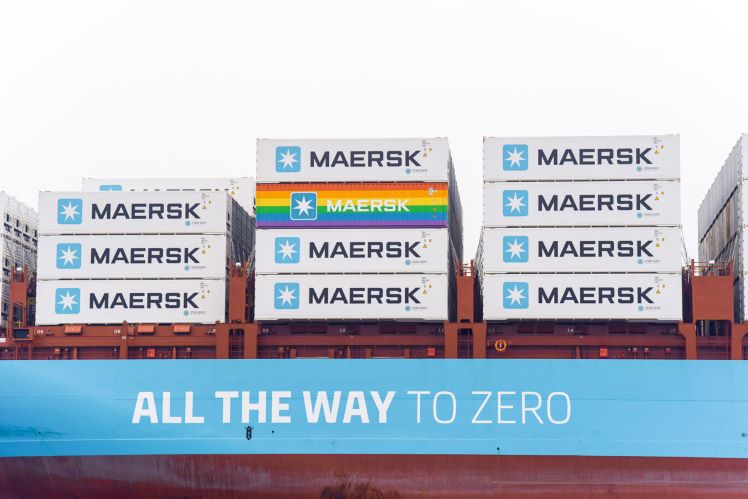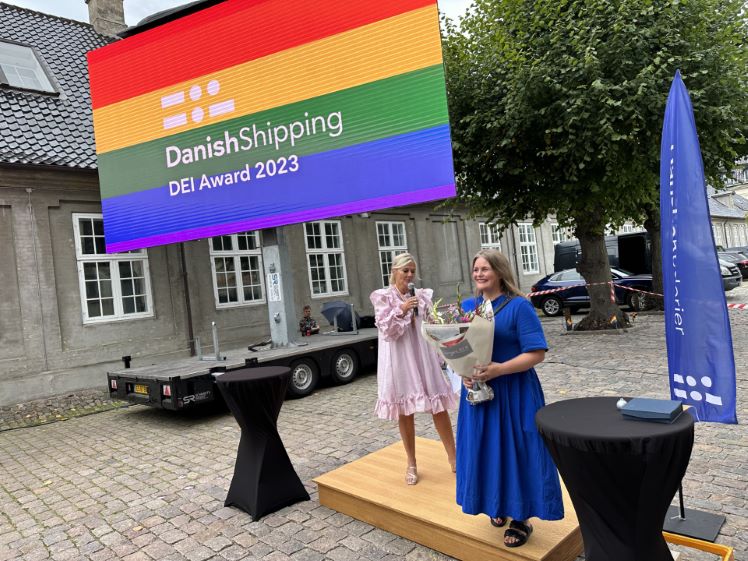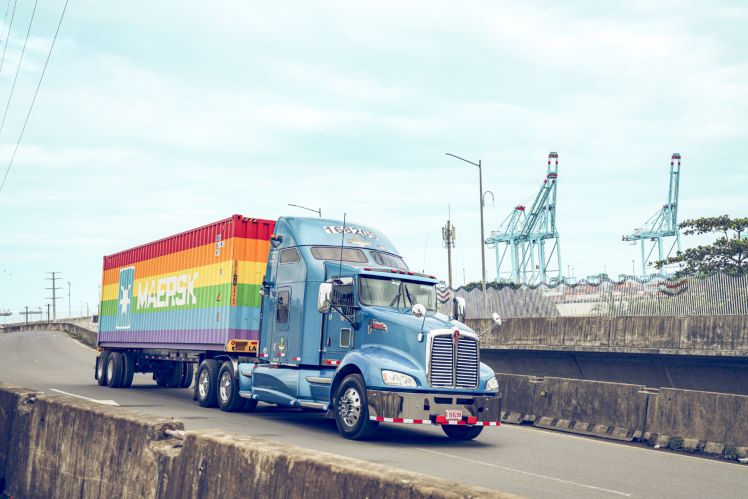A.P. Moller – Maersk works purposefully to focus on an inclusive and respectful working environment for all, ensuring better conditions for diversity and allowing the shipping company to attract and retain more minorities, including women. This has the potential to strengthen physical safety on ships.
Trine Lundgaard Hoffmann of A.P. Moller – Maersk won the DEI 2023 in August for her and her colleagues' work with diversity, equality and inclusion, which she manages at the shipping company. She sees the award very much as a pat on the back for the campaign 'On Our Respect Radar', which UFDS itself encountered during our visit to Marseille Maersk earlier this year.
Through the campaign, Maersk focuses on all aspects of the psychological work environment that can play a role for the company's employees on the front line, i.e., on the ships and in the offices, and what it does to a person if he or she does not feel safe enough to speak up, not least in a safety context.
The psychological aspects are also a central part of the management program 'Leading as one', which also addresses the dialogue all the way around, i.e., not only between the seafarers on the ships, but also between land and sea, and how the people on shore can install value in their ocean-going colleagues.
According to Trine Lundgaard Hoffmann the DEI Award can help to shine some light on the fact that everyone has a share of the responsibility for creating a psychologically safe space for seafarers, so that they can carry out their work as safely as possible, and they can say no if needed.
»It's incredibly meaningful that the focus is on our frontliners, and not just us in the offices, even though we're easier to assemble. It's harder to get in touch with the sailors, it's hard to train them practically, so I really like that Maersk has decided that this shouldn’t be an excuse, but that we will do something about it,« she says.
Concurrently, she can also attest to a high degree of responsiveness and curiosity from colleagues, ranging from captains looking for a piece of advice for their communication on sensitive topics, to ship designers striving to produce vessels where all body types feel comfortable and safe.
Maersk is also working on a project on workwear, where the idea of making something specifically targeted at women were quickly scrapped to the realization that efforts should be centered around the size of the clothes and making them fit everyone regardless of gender, height, and build.
»It's not necessarily a gender question whether you fit our boiler suits, it could just as well be a question of where you were born or how tall you happen to be,« Trine Lundgaard Hoffmann says.
Thus, she experiences a great level of understanding of the fact that you cannot remove safety from the equation when it comes to a healthy working environment on board the ships, an effort she labels 'extremely important' without hesitation.
Nowhere near the finish line
As a whole, Trine Lundgaard Hoffmann has the impression that people in Maersk broadly welcome the various initiatives towards diversity, inclusion, and the working environment. In a multinational company where the more than 100,000 employees have very different backgrounds, this is not necessarily a matter of course.
For many employees, these are in many ways very new topics to deal with, she explains, but nevertheless something that is welcomed with great curiosity. Conversely, there are many others for whom it is already everyday praxis, thus letting them embrace the message with ease.
»In addition, there is always someone who wants to focus first and foremost on the operation of the ships and adhering to the sailing schedules, so we see very different reactions to these things. But I think we’ve come a long way compared to the starting point, and there are issues we address more comfortably now, such as psychological safety,« Trine Lundgaard Hoffmann says.
However, this certainly does not mean that the company have reached their target, as she immediately adds, and the question remains whether this will ever happen, with new issues and coworkers a constant on the horizon. The important thing is to maintain an ongoing dialogue, making it safe to talk things over.
To support this on the ships, Maersk has designed sessions that can be held with the entire crew with a focus on people being able to decode whether something is respectful, awkward or harassment. In small teams, the seafarers can discuss different real-life scenarios to try to agree on a category for each scenario.
»It’s a setting where people are sometimes surprised by the hard contradictions they can face, and how different understandings they have of these situations based on who they are and how old they are. And it doesn't necessarily have anything to do with nationality, it could also be age or upbringing, or how many management books you've read,« Trine Lundgaard Hoffmann says.
The crux of the matter is to create exciting conversations and at the same time present to the crew some tools to be more inclusive of each other, allowing management to be carried out on a more informed basis concerning the actual mix in the employee group.
Captains must be able to lead diversely
Taking the international crews and people's very different levels of experience into account, the link between psychological work environment and safety is something Maersk makes a point of on as many occasions as possible when educating offshore personnel.
This ranges from job interviews to signing contracts and in actual training courses, just as it is a focal point for safety departments through the project 'Briefing-debriefing', revolving around how the top-4 on the ships can open up for more two-way communication and knowledge sharing at morning and afternoon meetings using the principles of psychological safety.
»They get some tools to make sure that all voices are heard, and everyone feels comfortable in raising their hand and sharing an idea, or in disagreeing with the chief mate or the 1st engineer on something. It's something all managers have been introduced to, so we try to incorporate it into all sorts of contexts,« Trine Lundgaard Hoffmann says.
In practical terms, the training takes place both online via virtual meetings or e-learning, and in person at either Maersk Training's (MT) location in Svendborg or at centers around the world facilitated by MT. In this way, the aim is to accommodate all preferences in terms of teaching, and thus reach as wide an audience as possible.
»We try to mix people in relation to nationalities at the centers, because a lot of it is cultural, but there’s also a lot of generational aspects. We can observe this among our Danish sailors, who can heartily disagree on the ups and downs of these issues, also internally between the sexes,« she says.
In general, Maersk puts a lot of effort into making diversity a part of recruitment, but to a great extent also into being an attractive workplace to all types of people and minorities. 'If you build it, they'll come', as Trine Lundgaard Hoffmann says of the approach.
»I can see my colleagues starting to address these matters when interviewing candidates facing a promotion to captain. They question the person on leading a diverse team, in addition to handling the technical stuff, which is of course still important, but just not dominant anymore. And I'm immensely proud and happy about that development,« Trine Lundgaard Hoffmann says.
An agenda that is here to stay
Even though things are moving in the right direction, Trine Lundgaard Hoffmann has no doubt that a lot more steps can be taken both within Maersk and across the shipping industry at large to further highlight the link between the psychological working environment and physical safety at sea.
As an example, she mentions how Maersk's internal safety award, the Global Safety Award, this year focused on creating safe working environments under the theme 'Make it safe to speak up', and how the topic in general is taking up more and more space across the huge organization.
»Maersk is very visible around the Pride movement and that you should be able to be who you are, which also helps our agenda in the container business, as I see it. The more we focus on these things in our communication, the easier it will be to get the message across to our sailors,« Trine Lundgaard Hoffmann says.
She points out that many of Maersk's employees at sea pay close attention to the company's social media channels as a source of knowledge to what is happening in the company – for example concerning equality on Instagram – and that it is therefore extremely important that the diversity agenda is strongly present on these channels.
In this respect, the Diversity Award 2023 is obviously a good opportunity to spread the word on the efforts and look forward to delving further into the area. Of course, the effort must continue, so that everyone –internally as well as externally – will know that this is an agenda that is here to stay.
»It wasn't just a campaign we ran in 2022 and '23, ‘this is not a diet, it's a lifestyle change', as we say, and we can't just count on people to hear these messages once and then adopting them. After all, no shipping company in the world would do that if it were a matter of physical safety; use of lifeboats, firefighting or whatever,« Trine Lundgaard Hoffmann says.
Likewise, the agenda may also take up even more space in both introductory courses and in connection with promotions to the top positions on the vessels, she points out. In other words, the top-4 must not "only" be able to lead in a classic, maritime structure, but also have some tools to lead diversely.
This is something in which especially the younger generations have begun to show interest, not only in Denmark, Trine Lundgaard Hoffmann explains, but also in, for example, India, where she has visited Maersk's training center in Chennai and met cadets with great curiosity about diversity and inclusion at sea.
»They would adore a visit from the rainbow container, and they think that Maersk's values are very exciting and different from what they are otherwise exposed to in the industry. So, I hope that the people we bring into the pipeline to become the leaders of the future possess these values and can see the benefits of creating a good and inclusive working environment, which must come from both managers and other employees,« she says.



